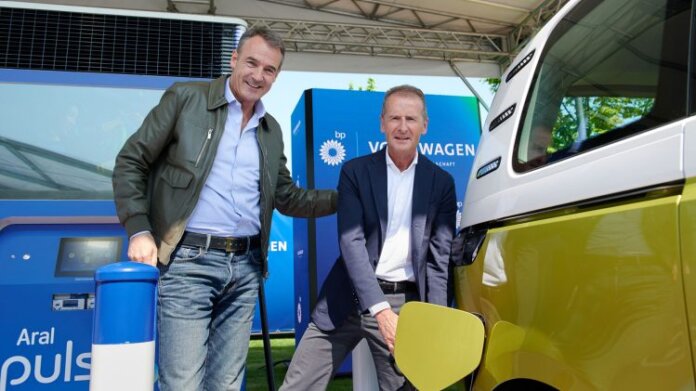Volkswagen and bp have launched a strategic partnership that will boost the adoption of electric vehicles (EV) across Europe, unveiling the first charger in Dusseldorf, Germany. The two companies are looking to transform access to EV charging in key European markets by rapidly building a fast-charging network across Europe by 2024.
“EV charging is one of the key engines driving bp’s transformation to an integrated energy company,” states Bernard Looney, CEO of bp. “That’s why we’re so excited by our partnership with Volkswagen. When you bring together one of the world’s leading car makers and one of the world’s leading energy companies – the opportunity is huge. This is a significant step-forward on our journey to accelerate the electrification of transport in Europe.”
Volkswagen’s Flexpole 150 kW charging units, each of which feature two charge points, have an integrated battery storage system, overcoming one of the biggest obstacles to the rapid roll-out of fast-charging infrastructure in Europe today – the need for high-powered grid connections. The Flexpole units can be directly connected to a low-voltage grid, which removes the requirement for a dedicated substation and costly construction work, significantly reducing installation times while still providing fast-charging speeds of up to 150 kW, enough to deliver up to 160 km of driving in as little as 10 minutes, depending on the EV model.
“Volkswagen has been pioneering the transformation to e-mobility across Europe,” says Herbert Diess, Volkswagen’s CEO. “Today we have the broadest offer of electric cars in the market and sold more EVs in the region than any other carmaker last year. Investing in everything from software to batteries and charging is part of our strategy to make individual mobility safer, more convenient and fully climate-neutral. The decarbonization of Europe’s economy requires close collaboration across borders and sectors. We’re pleased to team up with bp to accelerate the roll-out of the fast-charging network across Europe.”
The first phase of the roll-out will see up to an additional 4,000 charge points at bp’s Aral retail sites in Germany and bp retail sites in the U.K. over the next 24 months. By the end 2024, up to 8,000 charge points could be available across Germany, the U.K. and other European countries.
“bp has served customers on-the-go for decades in Europe and across the world,” comments Emma Delaney, bp’s executive vice president of customers and products. “With the transition to electric vehicles well underway in Europe, we want to provide fast, reliable charging and convenience to EV drivers on-the-go.”
The charger locations will be integrated into the navigation and other in-car apps of VW, Seat and Skoda vehicles as well as into Volkswagen’s charging application, Elli, making it easier for drivers to find available charging points. Any EV driver will be able to use the new chargers as part of the bp pulse and Aral pulse network enabling all EV drivers to sign up and collect rewards from bp/Aral loyalty programs.
“We are delighted to announce this partnership with VW,” adds Delaney. “The flexible battery-based chargers will accelerate bp’s fast charging network roll-out at our well-located sites in Europe. We are planning up to 4,000 additional charge points in Germany and the UK in the near term – a turbo-boost for our fast-charging network in these countries.”
Under the terms of their agreement, VW and bp will also look to pursue further opportunities together to provide future solutions for lower carbon mobility.
“As we promised at our Power Day, we are driving the expansion of charging infrastructure in Europe at high speed,” remarks Thomas Schmall, a member of the board of management of Volkswagen Group and CEO of Volkswagen Group Components. “Together with bp, we will bring thousands of fast-charging stations to life within a very short time. Rapid expansion of the charging network is crucial now. To make that happen, our pioneering flexible, fast chargers offer a perfect solution, since the time and costs required for installation are minimal.”





